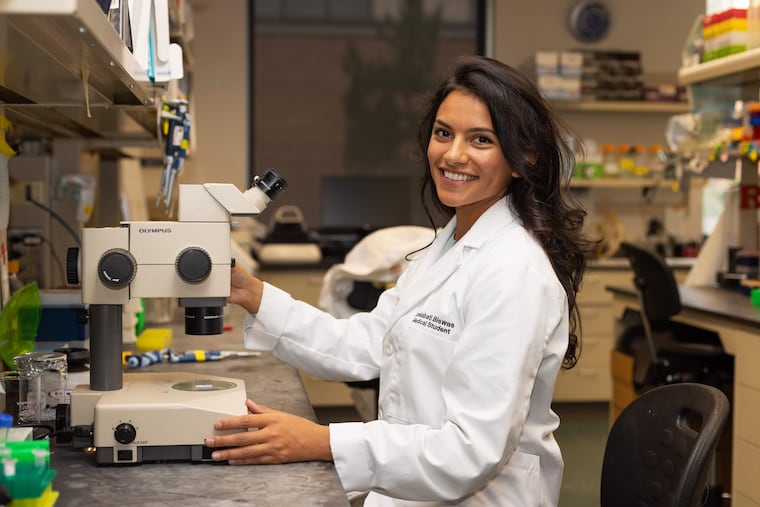A blood test that identifies people at higher risk of miscarriage? That’s the goal of this award-winning Rutgers med student.
Leela Biswas just won an American Medical Association competition for her research identifying a genetic mutation that may increase the risk of infertility.

People who want to get pregnant after age 35 are warned that the quality of their eggs may have deteriorated, raising the risk of miscarriage. But for some, the decline can start up to a decade earlier, and they don’t realize it in time to consider other options.
Could the solution be a simple genetic test, requiring just a few drops of blood? That’s the hope of Rutgers University medical student Leela Biswas, who just won an American Medical Association competition for her research on the topic.
A Widener University graduate who grew up in Voorhees, Biswas discovered a genetic variant that appears to play a role in why some eggs have the wrong number of chromosomes, winning the $10,000 top prize in the AMA Research Challenge.
More study is needed before her findings could be incorporated into a blood test, but she envisions that someday people could be screened for the variant long before considering pregnancy. If they tested positive, they could have their eggs frozen before they start to deteriorate, or they could consider other options such as in vitro fertilization.
“The idea is empowering women with genetic information so they can make informed decisions about their fertility,” she said.
Biswas bested nearly 1,200 other entrants in the competition, which is open to med students, residents, fellows, and international medical school graduates. She is in the midst of a dual-degree program, training to be a physician at Rutgers Robert Wood Johnson Medical School while earning her Ph.D. in the lab of Karen Schindler, an associate professor at the Human Genetics Institute of New Jersey.
“Leela’s approach is a testament to her curiosity and creativity,” Schindler said.
Biswas said she has been keen on becoming a doctor for as long as she can remember.
At age 7, she took on her first patient: the family’s Doberman mix, Aina. The aspiring clinician performed a careful examination of her dog, probing the calluses that had formed on the animal’s elbows.
“I was really fascinated by that,” she said. “She was very patient.”
Biswas graduated from Eastern Regional High School in Voorhees, where her extracurricular activities included volunteering with medically fragile children at a nearby residential facility. She majored in biochemistry at Widener while working in a lab at Thomas Jefferson University’s Sidney Kimmel Cancer Center.
At Rutgers, Biswas has finished two years of med school, and is on track to earn her Ph.D. in 2024 before completing the M.D. degree in the two years after that.
The egg research began in the lab of Rutgers computational biologist Jinchuan Xing, who identified 1,488 genetic variants that were more common in patients at a fertility clinic than in the general population. From that total, he winnowed it down to nine variants that seemed likely to play a role in egg development.
Biswas and others then tested each of the nine variants in laboratory dishes, using tiny needles to inject genetic material into mouse eggs, and found that one variant, in a gene called KIF18A, seemed to cause the eggs to have the wrong numbers of chromosomes and related abnormalities.
Then it was time to test that variant in a whole mouse. Biswas used the CRISPR gene-editing technique to create mice with that variant, and sure enough, close to half of their eggs had the wrong numbers of chromosomes. That condition is called aneuploidy, which in humans is the leading genetic cause of miscarriage.
Upon further examination, Biswas saw that some of those poor-quality mouse eggs contained flaws in delicate structures called spindles, which ordinarily serve as scaffolds for chromosomes.
“I think of it like lining up a bunch of soldiers,” she said. “They have to be in the right place.”
These spindles, on the other hand, were in disarray.
The next steps include lab experiments to determine exactly how this variant disrupts the chromosomes in eggs. The Rutgers team also hopes to identify more patients with this genetic variant and monitor them as they try to become pregnant.
Biswas continues to take part in the research, but before it results in a commercially available blood test, she will have to move on. Her last two years of medical school await.
She has not yet decided what branch of medicine she wants to practice. Reproductive medicine is a possibility, but she also said she is interested in cancer medicine or any other field where she can use a patient’s genetic information to determine a personalized treatment.
“Thirty years ago, you couldn’t open up somebody’s genome and tell them what’s going on at a molecular level inside their body,” she said. “As those disruptive basic science advances occur, I want to be able to take from those and translate that to the clinic.”